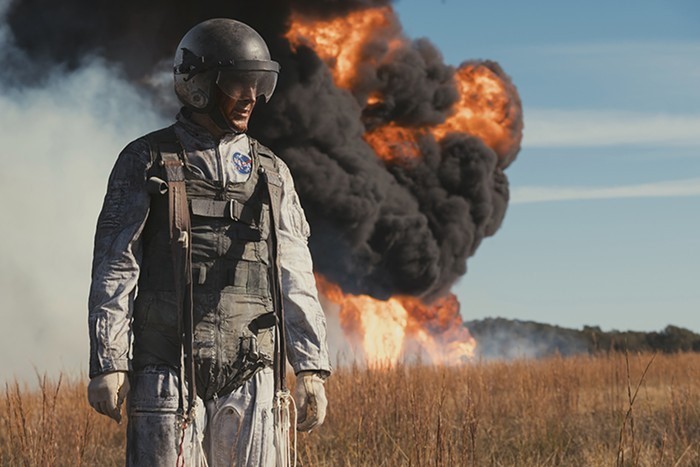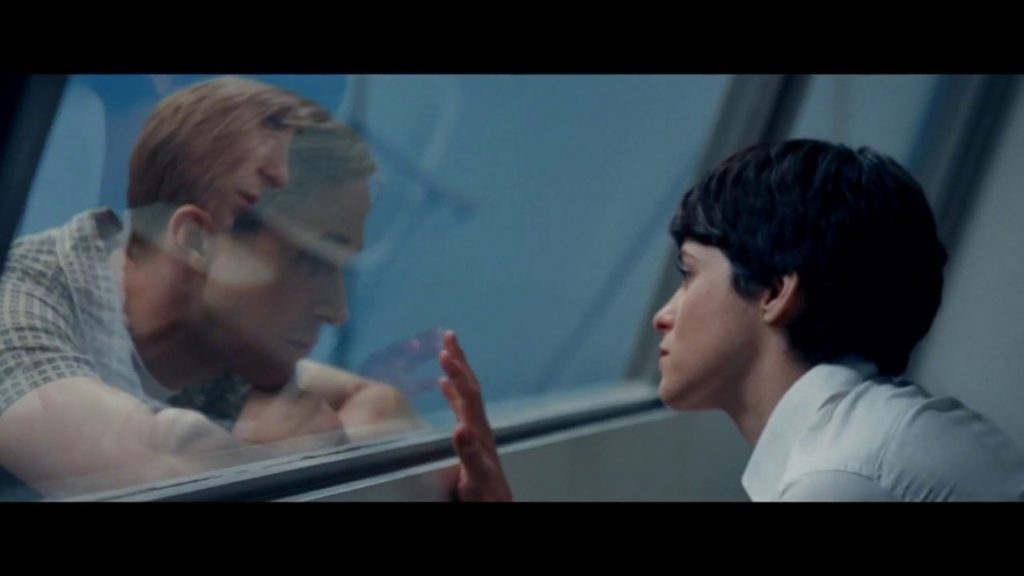“That’s one small step for a man, one giant leap for mankind.” –Neil Armstrong
History has been defined by the scope of our scientific achievements–and the advances we have made in space exploration are no exception. First Man (2018) maintains our enduring interest in the space film.
As the youngest recipient of the Best Director Academy Award and Golden Globe for his 2016 musical La La Land, Damien Chazelle has confirmed his status as an accomplished filmmaker with a distinctive voice. His films frequently center on protagonists who, to fulfill their personal aspirations, have to overcome the obstacles rooted within their socially conditioned roles. Whiplash (2014) examines the relationship between Andrew Neiman (Miles Teller) an ambitious first-year jazz drummer at Shaffer Conservatory (an esteemed music academy in New York City), and his strict, often sadistic jazz instructor, Terence Fletcher (J. K. Simmons), whose approval he ardently seeks. The film is inspired by Chazelle’s real-life experience with his former music teacher while attending Princeton High School. Similarly, La La Land follows up-and-coming jazz pianist Sebastian Wilder (Ryan Gosling) and aspiring actress Mia Dolan (Emma Stone), who ultimately sacrifice their relationship to achieve their respective artistic successes. The biopic First Man, adapted from James R. Hansen’s 2005 biography First Man: The Life of Neil Armstrong, focuses on the trials and tribulations of American astronaut Neil Armstrong’s (Ryan Gosling) personal and professional life, between 1961 and the 1969 Apollo 11 mission to the Moon.
Ryan Gosling garnered widespread recognition for his performance as Noah Calhoun, the starry-eyed lover of Allie Hamilton (Rachel McAdams) in The Notebook (2004); however, he hasn’t allowed himself to be typecast by this heartthrob image. Over the past two decades or so, Gosling has demonstrated his versatility as an actor, especially through his capacity to play vulnerable protagonists. Two roles worthy of mention are his Oscar-nominated portrayal as high school teacher/drug addict Dan Dunne in Half Nelson (2006), and his depiction of Lars Lindstrom, a delusional young man who forms a relationship with a sex doll he purchases online, in Lars and the Real Girl (2007). In historical drama First Man, Gosling plays an idealistic astronaut who is torn between his career goals and the challenges of family life–a role which enables him to showcase his ability to depict sensitive characters. Claire Foy helps to anchor the film’s lofty premise as the level-headed Janet Armstrong (Neil’s wife), and Kyle Chandler’s candid performance as Deke Slayton (NASA’s first Chief of the Astronaut Office) further grounds the film’s contentious subject matter.
Historically, film has predominately offered a glorified, and, by extension, untenable portrayal of space exploration. However, recently–due to advances in technology and a growing environmental awareness–this genre has undergone a renaissance. There are significant examples of this. Interstellar (2014), for example, is set in a dystopian future in which global famine renders Earth increasingly uninhabitable, and in which engineer and former NASA pilot Joseph Cooper (Matthew McConaughey) is tasked with leading a mission into outer space in an effort to colonize other planets. The Martian (2015), adapted from Andy Weir’s 2014 novel of the same name, centers on astronaut Mark Watney (Matt Damon), who, during a routine Mars expedition, becomes separated from the rest of the Ares III crew due to inclement weather–fearing the worst, they abort the mission, and Watney is left stranded alone. And Ad Astra (2019) follows astronaut Roy McBride (Brad Pitt), who embarks on a mission to Mars in an attempt to neutralize the power surges which threaten the survival of the universe.
On the surface, First Man appears to present a lionized representation of America’s role in the Space Race. Nevertheless, Chazelle gives the film’s politically loaded premise a character-driven focus. First Man’s core primarily hinges on the emotional turmoil Neil is experiencing after the death of his two-year-old daughter, Karen, and the extent to which this sorrow has catalysed his ambitions as an astronaut, specifically his decision to join Project Gemini. The depth of Neil’s sense of loss is keenly realized in one especially important scene, in which Slayton asks him to substantiate the notion of landing on the Moon. Neil articulately replies: “When you’re down here in the crowd and you look up, it looks pretty big and you don’t think about it too much. But when you get a different vantage point it changes your perspective.” Gosling’s work as the withdrawn space pilot is comparable to Sam Rockwell’s performance as astronaut Sam Bell in Moon (2009), a man isolated for three years on a solo mission, accompanied only by an A.I. named GERTY (reminiscent of HAL 9000: the sentient computer in 2001: A Space Odyssey, 1968). In both First Man and Moon, the protagonists’ isolation serves as a means by which they can evaluate their sense of self.

As the film progresses and the Space Race intensifies, the human casualties escalate. During the film’s climax, as the Apollo Lunar Module approaches the surface of the Moon, Chazelle employs a lively variation of Justin Hurwitz’s melancholic orchestral score, allowing the music to emphasize the significance of the Apollo 11 mission whilst alluding to the scale of the sacrifices that have been made to complete the operation. Throughout First Man, Hurwitz’s orchestral score is used to represent the film’s emotional arc, distilling America’s role in the Space Race. Later, after the crew of the Apollo 11 have successfully landed on the Moon, we perceive Neil with a pensive expression–he then drops a bracelet which belonged to his daughter, Karen, into the Little West crater. Over the course of the film, Neil’s accomplishments as an astronaut function as an allegory for his grief and, as he completes his mission, to some extent he is able to accept the loss of his daughter. In this climactic scene, Chazelle is once again committed to making the protagonist’s subjectivity the center of the film, and in doing so, he avoids aggrandizing the success of the Apollo 11 mission.
At the film’s resolution, after the crew of the Apollo 11 have returned to Earth, a two-shot portrays Neil and Janet contemplatively gazing at one another, in silence, through a glass partition inside a quarantine facility. The director consistently employs tightly framed compositions to both enhance First Man’s verisimilitude–especially during spaceflight scenes–as well as underscoring the film’s status as a character study. First Man has received critical acclaim, holding an 86% approval rating on Rotten Tomatoes and a score of 84 out of 100 on Metacritic, however, the film is considered a commercial disappointment, grossing just over 100 million dollars worldwide on an estimated 60-million-dollar budget. Chazelle has also been accused of taking artistic liberties and even of historical revisionism, largely due to the film’s absence of the flag planting. Nonetheless, despite such criticism, First Man does offer an intimate portrait of Neil Armstrong, his legacy, and the compromises he made to achieve his aspirations. By extension, the film arguably presents an unpretentious, and, therefore, realistic depiction of space travel.

Our fear of, and fascination with the unknown–most notably the ongoing search for life beyond our own planet–will encourage us to traverse the boundaries of space exploration, and ambitious filmmakers like Damien Chazelle will continue to reshape its representation in film.
Author Biography
Luke Batten graduated from Solent University, UK, with a BA in Film and Television Studies. His approach to film criticism is focused on film’s sociological implications. His publications include: “(500) Days of Manipulation: Challenging the Romcom” (2015), Anna Kendrick: Acting Real in Tinseltown (2017), “Groundhog Day: The Day Before Tomorrow” (2017), “Ingrid Goes West (2017)” (2018), and “Catch Me If You Can (2002)” (FM 9.2, 2018).
Film Details
First Man (2018)
USA
Director Damien Chazelle
Runtime 141 minutes








































